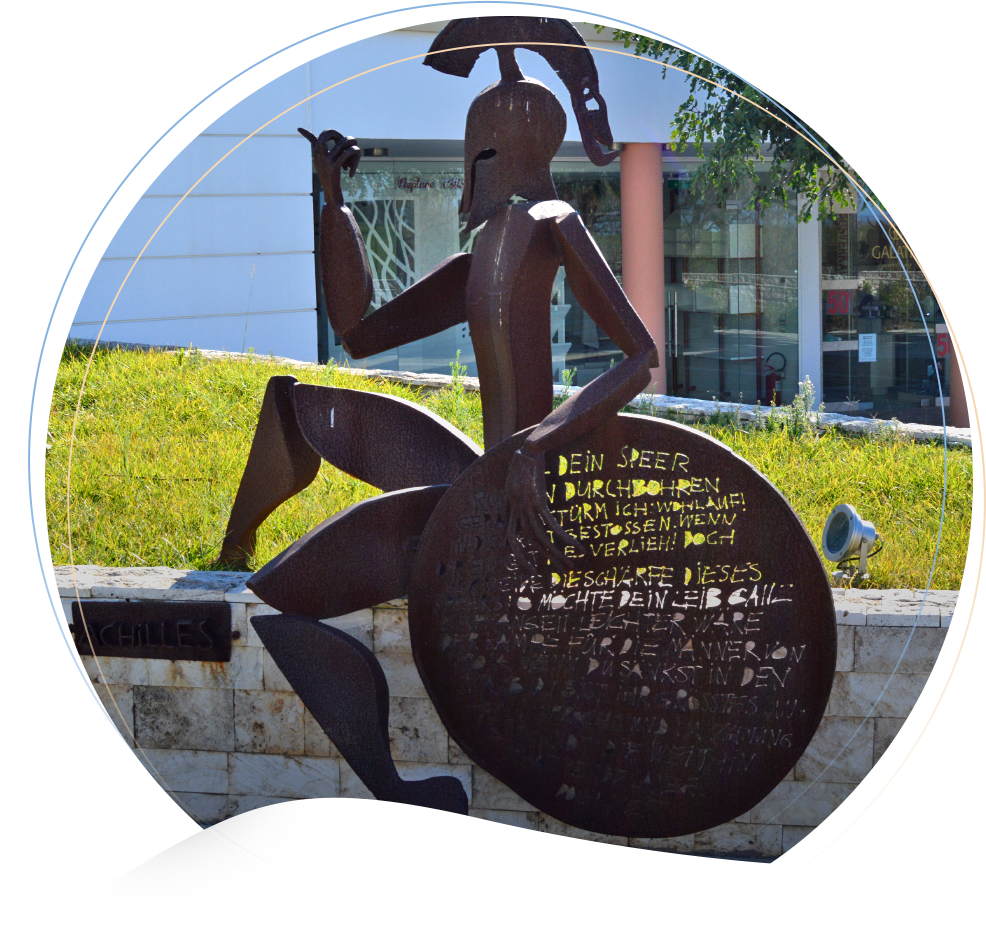The Greek hero Achilles is one of the most famous figures in Greek myth and a key character in the Trojan War and the Homer's Iliad. Achilles was the son of Peleus, a Greek king, and Thetis, a sea nymph. Zeus, the king of the gods and Poseidon, god of the sea, had both fallen in love with Thetis and were rivals for her hand in marriage. However, the gods were warned of a prophecy that Thetis would have a son who would grow up to be greater than his father. Worried by this, Zeus arranged for Thetis to marry a mortal man so that her child couldn’t challenge his power. Thetis gave birth to Achilles who, unlike her, was mortal. She attempted to make the baby Achilles immortal, by dipping him in the River Styx (the river that runs through the underworld), while holding him by his heel. The one part of his body left untouched by the waters becames his only point of weakness, hence the phrase ‘Achilles heel’.
In the Trojan war, Achilles commanded fifty ships. He was the leader of the army known as the Myrmidons and was the best fighter on the side of the Greeks. Troy was a well-defended city and nine long years of siege followed.
During the war, Agamemnon, the leader of the Achaeans, enslaved a woman called Chryseis. Her father, a priest of Apollo, begged the god to help her return to him. As a result, Apollo sent a plague to the Greeks. Agamemnon agreed to give the woman back, but then asked for Achilles' battle prize Briseis be brought to him to replace Chryseis. Angry at the dishonour of having his plunder and glory taken away, Achilles refused to fight and lead his troops alongside the other Greek forces. When the Trojans make gains in the battle, Agamemnon agreed to send an embassy to Achilles to try to persuade him to re-join the fighting by offering him a wealth of gifts. Achilles remained unmoved but he allowed his friend Patroclus to lead the Myrmidons into battle wearing his armour.
Although Patroclus succeeds in beating back the Trojan forces, Hector manages to kill him in battle. The real Achilles was utterly distraught by this event and declared his intention to kill Hector and avenge the death of his friend, despite his weeping mother’s revelation that, according to fate, his own death will follow that of Hector.
Achilles was determined to avenge Patroclus’ death at any cost and announced that he was ending his anger against Agamemnon in order to re-join the fighting. In the battle, Achilles chased Hector around the wall of the city, and plunged his spear into Hector’s neck. Then, he tied Hector’s body to his chariot and repeatedly dragged it around the tomb of Patroclus, in his furious need for retribution.
Eventually Hector’s father Priam, with the assistance of the god Hermes, made the dangerous journey to the Greek camp to see Achilles and beg for the return of his son’s corpse for burial. The two men weeped together and shared a meal. In a transformation of character, which restores humanity to the hero and a sense of order to the world, Achilles agreed to release Hector’s body. Priam returned to Troy with Hector’s body and the funeral marked the end of the Iliad.
After the death of Hector, who was the best fighter of the Trojans, they called on their allies to help them defeat the Greeks. The Ethiopian King Memnon brought his army to support the Trojans, but he was also killed by Achilles in battle. Achilles also fighted against the Amazons – the tribe of female warriors – and managed to kill their leader, Queen Penthesilea. Eventually, Achilles was killed by Paris, Hector’s brother, by shooting an arrow to his heel, guided by Apollo. His bones were mingled with those of Patroclus and funeral games were held.


 ALL STATUES
ALL STATUES